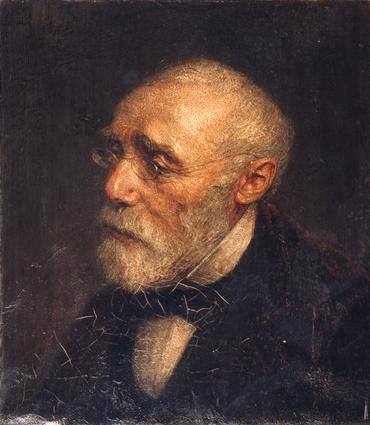version in original Dutch (citaat van Jozef Israëls's brief, in het Nederlands): Ik wil in den beschouwer mijne aandoeningen overbrengen, - ik wil hem laten boeijen door het tafereel, dat ik niet enkel met mijn bloot oog gezien hebben, maar dat ik diep in mij heb zien bewegen.
Quote of Israëls in his letter in 1891, to an unknown person; as cited in the museum-catalog, Museum Mesdag, 1996, p.236, note 10
Quotes of Jozef Israels, 1871 - 1900
Jozef Israëls: Frases em inglês
translation from the original Dutch: Fons Heijnsbroek
version in Dutch (citaat van Jozef Israëls, in het Nederlands): ..op mijn reizen bijvoorbeeld, in het buitenland,. ..ik zie dingen die me aantrekken, in werken van anderen, - die me imponeeren. Daar denk-je dan eens over na. En als je dan thuiskomt denk-je: zoo iets moet ik toch óók eens maken.. .Dan begin-je eraan, en als 't klaar is lijkt het op het werk van dien of dien.. Maar je eigen originaliteit gaat tòch niet verloren, - je sentiment blijft!. ..En zo gaat het niet alleen met mij, - zoo gaat het ook met anderen.. .Je bouwt onwillekeurig voort op motieven van ànderen..
Quoted by N.H. Wolf, in 'Bij onze Nederlandsche kunstenaars. IV. - Jozef Israëls, Grootmeester der Nederlandsche Schilders', in Wereldkroniek, 8 Feb. 1902
Quotes of Jozef Israels, after 1900
translation from the original Dutch: Fons Heijnsbroek
version in original Dutch (citaat van Jozef Israëls's brief, in het Nederlands): Ik wil in den beschouwer mijne aandoeningen overbrengen, - ik wil hem laten boeijen door het tafereel, dat ik niet enkel met mijn bloot oog gezien hebben, maar dat ik diep in mij heb zien bewegen.
Quote of Israëls in his letter in 1891, to an unknown person; as cited in the museum-catalog, Museum Mesdag, 1996, p.236, note 10
Quotes of Jozef Israels, 1871 - 1900
